“You could just disappear and never come back!” exclaimed my 11-year-old son while I was planning a trip to Bermuda for the destination wedding of a first cousin. Truth be told, like him, I had also been fascinated by fables of mysteriously disappearing planes and ships over the infamous Bermuda Triangle—a patch of ocean that lies between Florida in the US, Bermuda and Puerto Rico.
A week later, sans drama over the Atlantic Ocean, our flight landed uneventfully at Bermuda's L.F. Wade International Airport. Thankfully, that was the only humdrum element of the trip to the country made up of 181 small islands. What a marvellous archipelago of surprises Bermuda turned out to be!
The journey from the airport to the hotel was picture-perfect. We were transported to an Enid Blyton storybook set in a never-ending garden, with glimpses of cerulean ocean alongside. The first building I saw was a charming, mint green cottage called Bailey’s Ice Cream parlour that fit right into Noddy's Toyland.
The taxi driver, knowledgeable and articulate, gave us our first insights into Bermuda. Over the next few days, each taxi ride turned out to be a lesson on this island paradise, from its proud countrymen. Taxis that have a blue flag fluttering on their bonnets indicate that the driver is a government certified tour guide.
As we drove along smooth, narrow roads that curved around pretty pastel cottages with wooden-shuttered windows and white roofs, we learnt that the uniform roofs, while looking elegant, were built for a specific purpose. As there is no freshwater source in Bermuda, slanted and stepped roofs made of limestone are required by law for homes and establishments, to purify rainwater and make it drinkable. The rainwater that falls on the roof goes through a series of grooves and gets filtered over the bleached limestone surface; it then gets stored in an underwater reservoir.
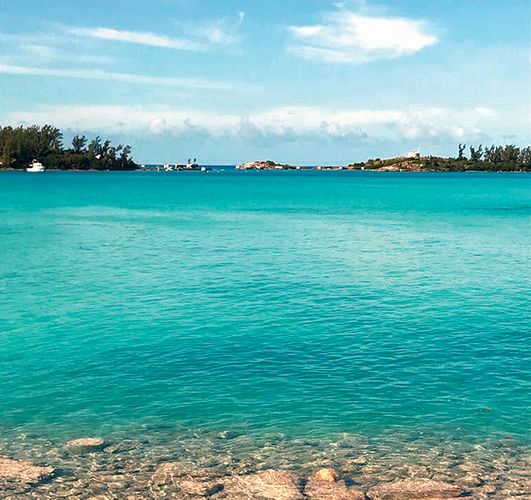 Cerulean and pristine: Bays and the ocean are visible from almost every point in Bermuda | Dushyant Pathak
Cerulean and pristine: Bays and the ocean are visible from almost every point in Bermuda | Dushyant Pathak
This is the most widely used method of making safe drinking water in Bermuda. In fact, it is such an intrinsic element on the islands, that there is a roof-wetting ritual when a new house or office building is built. The owners and their companions climb onto the roof with a ladder and helmets, and pour a bottle of black rum on it, and then share some among themselves. It's done with the belief that rainwater and moisture will be captured in the roof.
The primary reason for Bermuda’s English-looking landscape is that the country is a British Overseas Territory—the oldest among the remaining 14—with no signs of an impending uprising! It’s no surprise then, that British tradition and culture are integral to the Bermudian way of life, though some aspects have organically adapted, making them uniquely Bermudian.
A noticeable adaption was because of the weather. Being the northernmost coral islands in the world, Bermuda enjoys an agreeable sub-tropical climate, very different from dreary British weather. Herein lies the origins of Bermuda’s national dress; a clear standout consisting of Bermuda shorts paired with a collared shirt, tie, long socks and a blazer.
There are two stories of the origin of the world-famous Bermuda shorts.The first is that during World War I, Britain needed a tropical uniform for its hottest colonies, and shorts were introduced to its North Atlantic headquarters in Bermuda, as well as to other tropical colonies. In the 1920s, bankers and businessmen in Bermuda adopted the short trousers as work-wear and Bermuda then appropriated the name.
The second, more interesting story, is from Tabs, an award-winning company that sells authentic Bermuda shorts in the capital city, Hamilton. Native Bermudian Nathanial Coxon owned one of the only teashops in Bermuda and his little teashop was soon flooded with naval officers. Business boomed for Coxon but his busy tearoom quickly turned into a sauna with all the steaming pots of tea. His employees complained about the heat as their uniforms consisted of a navy blue blazer and khaki pants. Not wanting to spend money on a new wardrobe for his employees, Coxon took their khaki pants and cut them just above the knee to create the very first pair of Bermuda shorts.
Rear Admiral Mason Berridge, who took his tea in Coxon’s, decided to adopt the style for his fellow officers and coined the attire 'Bermuda shorts'. Berridge later went on to credit Coxon for his creative solution and Coxon was awarded an OBE (Order of the British Empire).
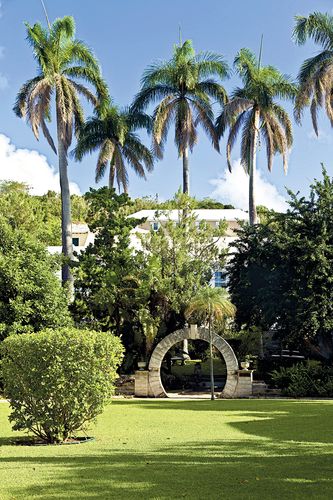 For good luck: Moongates are a common feature, especially in gardens.
For good luck: Moongates are a common feature, especially in gardens.
The pairing of the shorts with long socks came about during World War II, when there was a shortage of clothing in Bermuda. Legend has it that the managers of two banks in Bermuda arranged for a local tailor to make two pairs of shorts for each of their male employees, modelled on the shorts from the British military that Coxon and Berridge had made famous. The employees were also supplied with long socks to wear with the shorts. The look was a success, and local departments stores started selling the shorts in a range of bright hues. However, many gentleman thought the shortness of shorts inappropriate. So, a law was passed to ensure propriety, and policemen armed with a tape measure and warning tickets combed the island for men showing more than six inches of leg. Officially, Bermuda shorts should not be worn more than six inches above the knee.
Today, you will see businessmen, students, and hotel and restaurant staff wearing the shorts with long socks all year long. The bellboys at our hotel proudly sported their long socks with pink shorts. During the opening ceremony of the Olympics, Bermuda's delegation traditionally wears red shorts; red being the primary colour in the country's flag. At a Bermudian wedding, it is traditional for the groom and groomsmen to wear the shorts.
While the attire adapted, other elements remain staunchly British. Lawyers wear white wigs to court, and afternoon tea is very much part of Bermudian life. Like in India, and other former British colonies, Bermudians drive on the left side of the road, follow British spelling, its metric system and date format.
Being citizens of a British Overseas Territory, Bermudians enjoy benefits that include being able to live and work in the UK.
Would Bermudians's prefer independence? “The current government has expressed interest that it would like to see the idea of independence visited in the near future,” said Sara Johnson, 36, an underwriter, who lives in Bermuda. “Keeping in mind that it was elected this year, I feel that Bermuda could very well be talking independence fairly soon.” Do Bermudians view Elizabeth II as their queen? “No, not overly, especially not the xennial and millennial generations,” said Sara. “We have a strong sense of Bermudian pride, but I don't feel that it extends to British pride. If you ask a Bermudian what his nationality is, he will always say Bermudian first, and when pushed, British.”
In 1970, Bermuda changed its currency from the pound to the Bermudian dollar, which is on par with the US dollar. The decision made perfect sense as, besides being geographically so close to the US, Bermuda was evolving into one the world’s most successful offshore banking centres. Today, it’s main industries are banking and insurance, followed by tourism, and it enjoys one of the highest per capita incomes in the world.
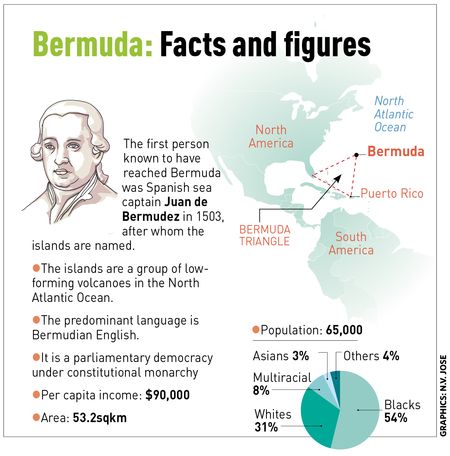
It was while we were there, that Bermuda and its queen found themselves at the centre of an international financial storm. A massive leak of 13.4 million files, stolen in a cyberattack, revealed the offshore financial affairs of thousands of politicians, celebrities, corporate giants and high-net-worth individuals. Referred to as The Paradise Papers, more than half these files were stolen from Bermuda-headquartered law firm Appleby’s. The files, which covered the period from 1950 to 2016, exposed the scale of the offshore haven Bermuda is. They revealed that global entities like Facebook, Apple and Nike, and high-net-worth individuals like musician and philanthropist Bono and Elizabeth II, as well as numerous Indian companies and individuals, had avoided paying taxes in their own countries by legally or illegally parking their money in Bermuda and other offshore locations by registering companies there and using them to hold assets such as property, aircraft, yachts and stocks. British racing driver Lewis Hamilton allegedly avoided paying tax on his yacht by registering it in Bermuda.
The world was engrossed in the details but for locals, it was life as usual. “People here are not talking about it [The Paradise Papers] that much,” said Skipper Ingham, 87, Bermuda's best known martial artist and the winner of numerous international titles and awards. Skipper is a legend in Bermuda and was instrumental in the development of marital arts there. In 1970, along with his wife Kristina, 72, he set up the country's first karate school. This year, Skipper was one of the grand marshals at the Bermuda Day Parade, which is held on May 24 every year.
Their daughter Shomeiko, 36, a personal trainer, pilates instructor and freelance dancer, who grew up in Bermuda, now lives in New York. “Once I left Bermuda and lived in a big city, I fully appreciated the country's beauty, its people and traditions,” she said. “It has a very laid back pace, extremely friendly people, and a small community, where you know everyone. “I miss traditions like flying kites and eating a fish cake sandwich on Good Friday. I also miss watching the Gombeys dance at various events.” (see box)
What is her response when New Yorkers ask her about the Bermuda Triangle? “I feel like when most Bermudians are asked about the triangle, their response is a big eye roll and a sigh! It's like some people are amazed that you can travel back and forth and not disappear. There is no disputing that ships and planes have disappeared there, but that could be from storms and sudden weather changes,” said Shomeiko.
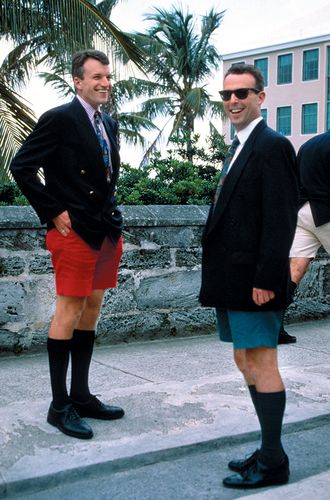 The long and short of it: Bermudian businessmen in traditional attire | Alamy
The long and short of it: Bermudian businessmen in traditional attire | Alamy
A number of wealthy people call Bermuda home. On one taxi ride, the driver pointed out an expansive beachfront property that he said belonged to former New York mayor Michael Bloomberg. The sprawling house that was built here consumed so much of the rare and expensive Bermuda cedar wood that it caused a shortage of the precious resource.
Kristina said, “Singer David Bowie [who died in 2016] and his wife, model and entrepreneur Iman, lived in Bermuda for a number of years, as did actors Michael Douglas and Catherine Zeta-Jones. Former Italian prime minister Silvio Berlusconi, too, owns a house here.” Fans of the fantasy drama televison series Game of Thrones might be interested to know that Cersei Lannister [actress Lena Headey] was not, in fact, born in Casterly Rock, but in Bermuda.
The islands are an ideal destination for a relaxed holiday. Its spectacular coral reefs are perfect for scuba diving and snorkeling. It has numerous pristine beaches, many with pink sand. The famous Horseshoe Bay is often rated as one of the top beaches in the world. For those wanting to stroll and wander, there are a number of idyllic towns and localities, including the historic town of St George, a UNESCO World Heritage Site.
Although busy with wedding shenanigans, I found time to visit the Crystal Caves and see its saltwater pools and 30-million-year-old stalactites. The caves were discovered in 1907, by two teenage boys who were playing cricket and lost their ball down a hole. They went looking for the ball all the way down the dark hole. There, they discovered the entrance to a spectacular natural wonder. Today, the caves are Bermuda’s most popular tourist attraction with thousands of visitors every year.
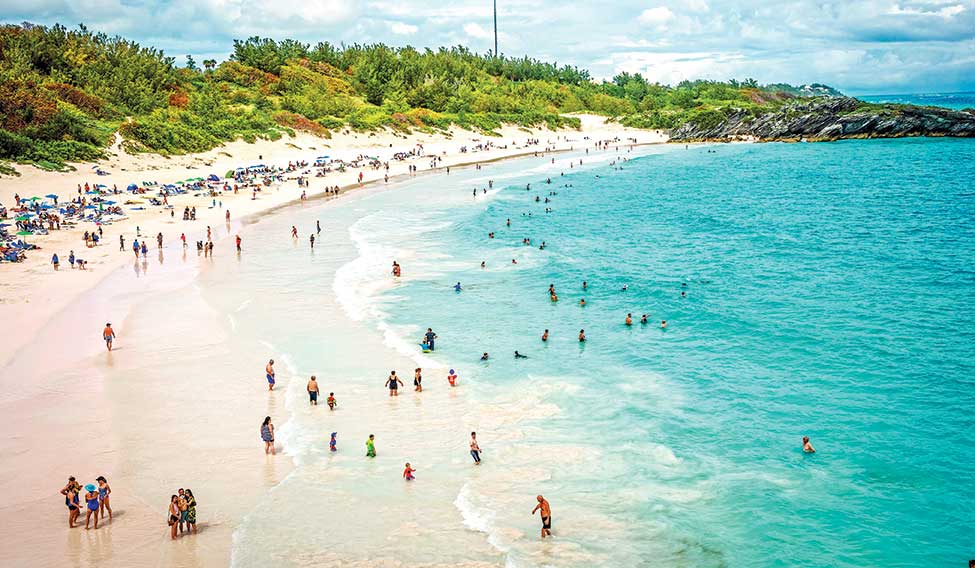 A sandy gem: Horseshoe Bay Beach is often rated as one of the best beaches in the world.
A sandy gem: Horseshoe Bay Beach is often rated as one of the best beaches in the world.
CELEBRATIONS AND TRADITIONS
MOONGATES
Centuries ago, Bermudians imported the idea of moongates from China. They are large rings of stones used as garden ornaments. Legend has it that walking through a moongate brings good luck. Almost all newly-wed couples in Bermuda walk through a moongate to bring good luck into their lives. The wedding cake usually has a cedar seedling on it which the couple plants in their front yard, believing that their love will grow in time, along with the tree.
BERMUDA’S GOMBEY
It has been a long tradition of Bermudians to perform Gombeys at festive celebrations. Originating from the Afro-Caribbeans, snare drums are used in pairs, along with kettle drums and fife. Usually, male dancers perform Gombeys in groups of 10-30 in colourful makeup and elaborate outfits, including tall hats with peacock feathers. The energetic dance gradually picks up and grows faster with time and becomes a great spectacle.
KITE FLYING AND FISH CAKES ON GOOD FRIDAY
Bermudians always fly kites on Good Friday. A kite-flying festival takes place in Horseshoe Bay where competitions are held for various categories, including the biggest kite and the one with best use of technology. Eating fish cakes stuffed in hot cross buns is also a Good Friday tradition.






